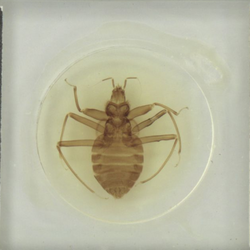Biology:Primicimex
| Primicimex | |
|---|---|

| |
| Preserved adult female of P. cavernis | |
| Scientific classification | |
| Domain: | Eukaryota |
| Kingdom: | Animalia |
| Phylum: | Arthropoda |
| Class: | Insecta |
| Order: | Hemiptera |
| Suborder: | Heteroptera |
| Family: | Cimicidae |
| Genus: | Primicimex Barber, 1941 |
| Species: | P. cavernis
|
| Binomial name | |
| Primicimex cavernis Barber, 1941
| |
| Synonyms | |
| |
Primicimex is a monotypic genus of ectoparasitic bed bugs in the family Cimicidae, the only species being Primicimex cavernis,[1][2][3] which is both the largest cimicid, and the most primitive one. It feeds on bats and was described from Ney Cave in Medina County, Texas but has since been found in four other caves in Guatemala, Mexico, and southern United States.[4]
Description
Like all cimicids, Primicimex cavernis is flat and oval-shaped, becoming plumper after feeding. It is unable to fly and has beak-like mouthparts with which it pierces the skin and sucks the blood of its host.[5] It differs from other cimicids (except Bucimex chilensis) in having claws and a row of erect, peg-like spines on the tarsus and has been observed using these structures to cling onto the bat's pelage.[6]
Ecology
Primicimex cavernis and its nearest relative, Bucimex chilensis, are the only members of the cimicid subfamily Primicimicinae. Their hosts are exclusively bats; in the case of P. cavernis, this is the Mexican free-tailed bat (Tadarida brasiliensis), although the ghost-faced bat (Mormoops megalophylla), which roosts in the same cave, may act as a secondary host.[6] Ney Cave is a limestone cave in semiarid savannah grassland with oak (Quercus), mesquite (Prosopis) and grasses. The cave is a seasonal roost used by the bats as nursery quarters, and at dusk during the summer, upward of 400,000 bats may stream out of the cave entrance to forage for insects, returning to the roost before dawn. The young are mostly born in June and remain in the roost until able to fly, at about 40 days of age.[7] Cimicids have the ability to survive for long periods without feeding, and this allows Primicimex cavernis to hide in crevices, awaiting the return of their hosts from their over-wintering sites.[6]
Like other cimicids, Primicimex cavernis feeds exclusively on blood. It also performs traumatic insemination with the sperm being injected through the body wall but it is exceptional within the family in that at the injection site females do not possess a special female organ called the spermalege.[8]
References
- ↑ "Primicimex Report". https://www.itis.gov/servlet/SingleRpt/SingleRpt?search_topic=TSN&search_value=107082.
- ↑ "Primicimex". https://www.gbif.org/species/2021047.
- ↑ "Primicimex genus Information". https://bugguide.net/node/view/1044288.
- ↑ Usinger, Robert Leslie (1966). Monograph of Cimicidae (Hemiptera, Heteroptera). Entomological Society of America. pp. 294–295. http://painreliefnomed.com/ebook/Monograph%20of%20Cimicidae.pdf#page=304. (39 MB)
- ↑ Jones, Susan C.; Jordan, Kyle K.. "Bat Bugs". Ohio State University Extension Fact Sheet. Ohio State University. http://www.scent-tek.com/bed_bugs/continued_learning/ohio_state_university_battle_bugs.pdf.
- ↑ 6.0 6.1 6.2 Ossa, Gonzalo; Johnson, Joseph S.; Puisto, Anna I. E.; Rinne, Veikko; Sääksjärvi, Ilari E.; Waag, Austin; Vesterinen, Eero J.; Lilley, Thomas M. (February 2019). "The Klingon batbugs: Morphological adaptations in the primitive bat bugs, Bucimex chilensis and Primicimex cavernis, including updated phylogeny of Cimicidae". Ecology and Evolution 9 (4): 1736–1749. doi:10.1002/ece3.4846. PMID 30847069.
- ↑ Reichard, Jonathan D.; Gonzales, Lauren E.; Casey, Caitlin M.; Allen, Louise C.; Hristov, Nickolay I.; Kunz, Thomas H. (2009). "Evening emergence behavior and seasonal dynamics in large colonies of Brazilian free-tailed bats". Journal of Mammalogy 90 (6): 1478–1486. doi:10.1644/08-MAMM-A-266R1.1.
- ↑ Reinhardt, Klaus; Siva-Jothy, Michael T. (Jan 2007). "Biology of the bed bugs (Cimicidae)". Annual Review of Entomology 52: 351–374. doi:10.1146/annurev.ento.52.040306.133913. PMID 16968204. http://www.falw.vu.nl/nl/Images/siva%202006_tcm19-30750.pdf. Retrieved 26 May 2010.
Further reading
- Péricart, J.; Golub, V. B. (1996). Catalogue of the Heteroptera of the Palaearctic Region, Vol. 2: Cimicomorpha I. The Netherlands Entomological Society. ISBN 978-90-71912-15-3. https://www.researchgate.net/publication/328837905.
- Schuh, Randall T.; Weirauch, Christiane; Wheeler, Ward C. (2009). "Phylogenetic relationships within the Cimicomorpha (Hemiptera: Heteroptera): a total-evidence analysis". Systematic Entomology 34 (1): 15–48. doi:10.1111/j.1365-3113.2008.00436.x. http://research.amnh.org/scicomp/pdfs/wheeler/Schuhetal2009.pdf.
Wikidata ☰ Q18104105 entry
 |

